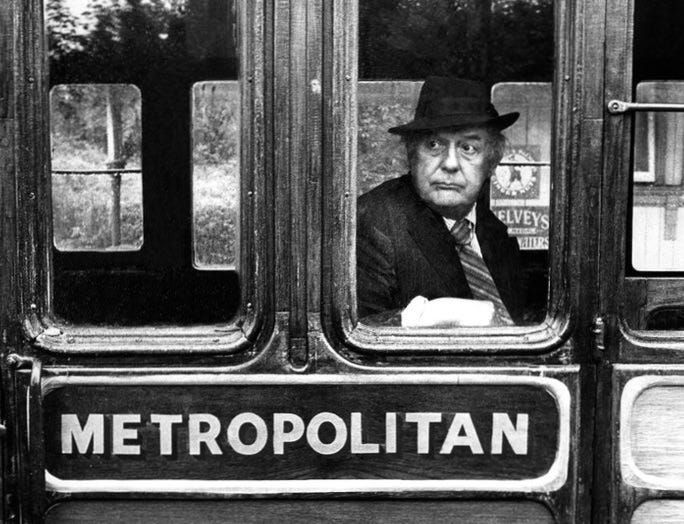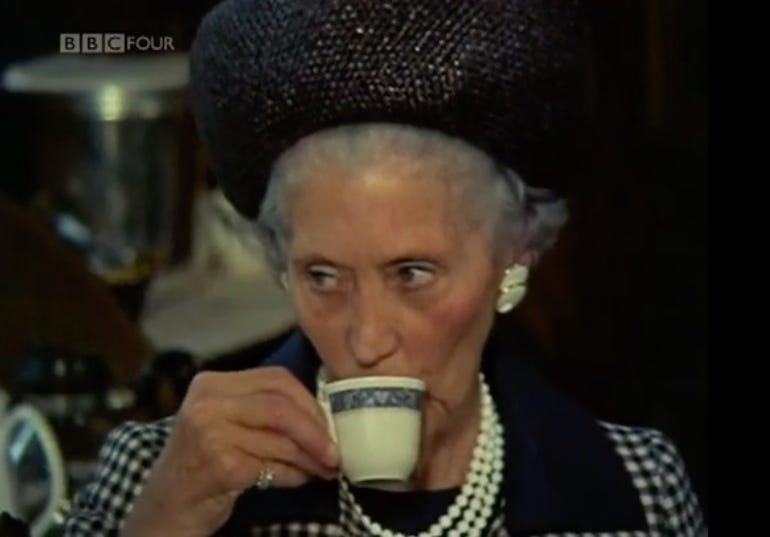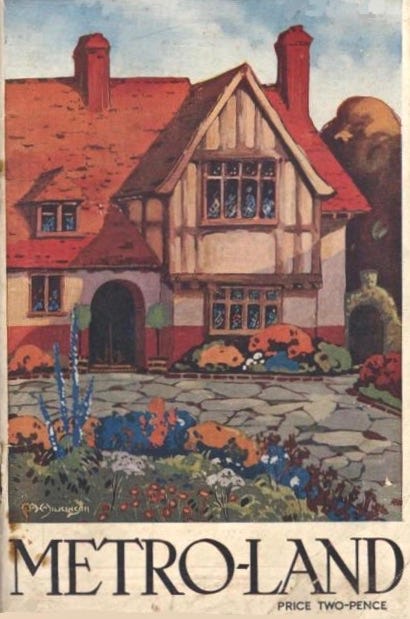Metro-Land (1973)
"A city clerk turned countryman again..."
Daily into Ruislip Gardens
Runs the red electric train
With a thousand Ta’s and Pardon’s
Daintily alights Elaine…
From Middlesex by Sir John Betjeman (1954).
Dear old Betj. Metro-Land (1973) is Betjeman’s poetic, affectionate— and sometimes poignant— journey through the suburbs of North West London, from the grandeur of the Metropolitan Railway’s Chiltern Court Hotel (begun 1912), to leafy St John’s Wood— “forerunner of the suburbs yet to come, where lived artists and writers and military men...” “and here screened by shrubs... lived the kept women” (in) “houses of sin and mystery”; from the Midsummer revels of Croxley Green to the twitchers of Neasden; from the Byron Ladies’ Luncheon Club to the speckled straw hats of Harrow School. The documentary film was directed by the distinguished television director Edward Mirzoeff, written and narrated by the Poet Laureate, Sir John Betjeman, and first shown on BBC 2 on a late Monday evening in February 1973. It’s a sort of documentary film essay, semi-autobiographical in places— the BBC at its best— which must have inspired, to some extent, Jonathan Meades’ brilliant and original (even subversive) documentaries of 1987-2019, some of which are available to watch again in a desirable DVD box set, The Jonathan Meades Collection, and comes with my recommendation.
The directors of the Metropolitan Railway (the world’s first Underground railway) planned to link Manchester, in the North, with Paris in the South, via a futuristic Channel Tunnel, with London being a stop-off point along the way. Which, of course, never happened. The Metropolitan Railway finally arrived at Amersham, in ‘far away Buckinghamshire’— and that was that. Oh, vanished self-confidence! But as the Metropolitan Railway stretched its tentacles outwards, towards leafy Buckinghamshire and Hertfordshire, considerable plots of land, on either side of the railway track, were sold to speculative builders. During the First World War and in the early 1920s, Mock Tudor houses (‘An Englishman’s Home is his Castle’) began to sprout like mushrooms, amongst the gently rolling hills of that most English of counties— Middlesex, the county that once inspired Keats; on fields ‘once bright with buttercups’. The irony, of course, was that the new housing estates destroyed the Arts & Crafts idyll they were supposed to represent in the first place. Sunny Vale, Rose Leigh and Orchard Rise gave way to the motor-car, the commuter train, the Tudorbethan shopping parade; the butcher, the baker, the candlestick maker.
Betjeman, in many ways, was a psycho-geographer— before that slightly iffy term entered our language. A quest for the unusual in the ordinary; with that undefinable sense of place. And like the writer, Patrick Hamilton, he understood the poignant nuance of English gentility— although unlike Hamilton, his observations are tempered with an impish, wry affection. Compare Elaine’s ‘Ta’s and Pardons’ as she ‘hurries down the concrete station, with a frown of concentration…’ or Betjeman’s romantic lament for a lost, once rural Middlesex (‘recollect the elm-trees misty / And the footpaths climbing twisty’) with Patrick Hamilton’s ruthless, merciless, almost clinical— if oh, so sharp— condemnation of Mrs Plumleigh-Bruce’s literary pretensions: “the word ‘voracious’ is applied almost solely to reading by the Plumleigh-Bruce class.” Berkshire dwelling Mrs Plumleigh-Bruce. An Indian Army Colonel’s wife and Colonel’s daughter. Not that you should read this as a criticism of Patrick Hamilton (a brilliant observer) but the two men, I think, are masters of the same material, yet diametric. For, as with the music of Elgar or Gerald Finzi, with Betjeman there’s a very English melancholy— even sadness— for things lost forever. Goodbye England. It was good while it lasted. If it ever existed.
Betjeman’s love of, and deep knowledge, of architecture shines. He had that enviable knack of making a potentially dry, even academic, subject accessible, of evoking a romantic past from the seemingly mundane: like the duck pond at Grim’s Dyke on the ridge of the Harrow Weald, quite possibly the inspiration for Bawdry Court in Rebecca West’s The Return of the Soldier (1918), where librettist, W. S. Gilbert (of operetta fame), died of a heart attack rescuing two teenage girls, or Betjeman’s appreciation for architectural detail, quality and craft, like the heart-shapen iron mounts of an oaken front door at The Orchard, C. F. A. Voysey’s house in Chorley Wood, Hertfordshire, like something from Hans Christian Anderson or the Brothers Grimm.
This is English charm at its finest— Betjeman’s like a naughty schoolboy, if a gluttonous tub of Cornish ice-cream replaced with the Mock Tudor. There’s a lovely moment when he screws up his golf swing on the hallowed turf of Moor Park Golf Club— I have no doubt that it was deliberate, I gather Betjeman quite deliberately inserted slides upside down to amuse the audience during lectures. But that’s all part of the fun. During the 1970s, Betjeman led a successful campaign to save Liverpool Street Station. Today, the work of groups such as The Victorian Society and The London Gasketeers (the conservation group fighting to save London’s remaining historic working gas lamps) champion the spirit of Betjeman. And it’s still needed. Perhaps more than ever now.
I watched Metro-Land (1973) on Vimeo and it’s also available on DailyMotion. Both recordings are relatively decent and perfectly viewable if you can put up with a few minutes worth of dreary and predictable advertising. Metro-Land used to be available to watch on BBC iPlayer too, but it now seems to have been removed. But the good news is that World of Books is currently flogging a DVD on eBay for an eminently reasonable five quid. It’s a must. Alongside Betjeman’s other documentaries: Summoned By Bells (1976) (available to watch on YouTube) is especially poignant.
You’ve just been reading a newsletter for both free and 'paid-for' subscribers. I hope you enjoyed it. Thank you to all those of you who have signed up so far.
There are two options on Luke Honey’s WEEKEND FLICKS. Cinema for Grown Ups: ‘Paid-for’ subscribers get an extra exclusive film recommendation every Friday morning, plus full access to the complete archive— which is currently at film no. 76, and should list over a hundred films by the end of the year. It costs £5 a month (or £50 a year)— a bargain, frankly, when you compare it to a few cups of coffee, a packet of semi-legal gaspers, or a pint of beer in the pub. ‘Free’ subscribers get access to the Sunday newsletter, plus the ‘free subscriber’ films in the archive. Either option is a good bet. And when I get my act together, I’m planning to add a spoken voiceover (mine!) for paid subscribers.
I will be back next weekend. In the meantime, I hope you have a relaxing, and cinematic, Sunday.










What a jewel! I'd never heard of this film. Thanks a lot.
Thanks for this, I will look both films up, and the Jonathan Meades sounds intriguing. For a great fictional picture of the lure of the suburbs, try RC Sherriff's Greengates! https://harkness.substack.com/p/greengates